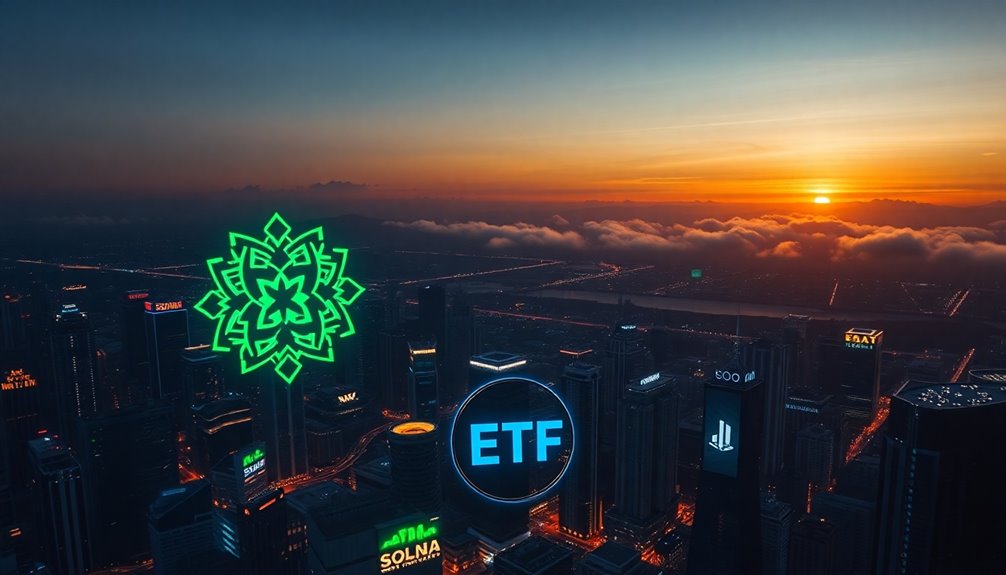Grayscale's plan to convert its Solana Trust into a spot ETF could revolutionize how you view and invest in crypto. With a recent price surge of 6%, market optimism is on the rise. If approved, this ETF could attract traditional investors, reshaping the crypto landscape and increasing liquidity. However, maneuvering regulatory hurdles remains a challenge, especially given the SEC's cautious stance. As competition heats up among firms like VanEck and 21Shares, the stakes are high. This ambitious move could spark a new era for Solana, revealing its potential in the crypto empire. There's plenty more to contemplate about this unfolding narrative.
Key Takeaways
- Grayscale aims to convert its Solana Trust into a spot ETF, potentially attracting traditional investors and reshaping the crypto ETF market landscape.
- Solana's price surged following the ETF filing, indicating market optimism and interest in the asset's future value.
- Competitive filings from firms like 21Shares and VanEck highlight the intense race for regulatory approval in the Solana ETF space.
- Institutional engagement is on the rise, with Solana-based DApps raising significant funds, showcasing growing interest in blockchain technology.
- Approval of a Solana ETF could enhance liquidity and spark an altcoin season, significantly impacting the broader crypto market.
Grayscale's SEC Filing Overview

Grayscale's recent SEC filing marks a pivotal moment for the cryptocurrency landscape, as it seeks to convert its Solana Trust into a spot ETF.
By submitting a 19b-4 filing, Grayscale aims to list the Solana Trust on NYSE Arca, expanding the reach of regulatory approval for crypto-based ETFs beyond just Bitcoin and Ethereum.
This move is essential, as the SEC must review the registration forms submitted not only by Grayscale but also by other notable issuers like VanEck and 21Shares.
Currently, the Solana Trust is the largest investment fund for Solana, managing $134.2 million in assets and holding around 0.1% of all Solana tokens in circulation.
Operating under SEC reporting requirements, it offers a financial product for both accredited and non-accredited investors.
The filing has already sparked a 6% surge in Solana's price, indicating market optimism.
If approved, the ETF could attract traditional investors, providing a regulated way to invest in SOL.
This aligns with Grayscale's strategy to enhance investor access to crypto assets, marking a significant step forward in the evolving regulatory environment for cryptocurrencies. Moreover, the growing interest in Solana ETFs reflects a broader trend in the crypto market that could further boost investor confidence.
The Spot ETF Filing Process

When you look at the spot ETF filing process, you'll quickly see it comes with its own set of regulatory approval challenges. Understanding the specific filing requirements is essential for traversing the competitive landscape of ETF issuers. With the cryptocurrency market evolving, staying informed about these dynamics can give you an edge in this fast-paced environment. The recent approval of Ethereum ETFs illustrates the increasing regulatory clarity that could pave the way for future spot ETFs in the cryptocurrency sector.
Regulatory Approval Challenges
Steering through the regulatory landscape for Solana's spot ETF filings presents significant challenges that can hinder progress.
You've probably noticed that the SEC has already rejected at least two applications for spot Solana ETFs, citing regulatory concerns. One major hurdle is the absence of a Solana futures market, which complicates the approval process by failing to mitigate worries about fraud and market manipulation. As highlighted by SEC Chairman Gensler, industry noncompliance has been a persistent issue that raises regulatory flags.
If Solana is classified as a security, it must also comply with stricter disclosure and reporting standards, increasing the regulatory burden on its ETFs.
The approval process itself is lengthy and involves a detailed review by the SEC that can take weeks or months. Issuers must refile 19b-4 forms, addressing concerns about investor protection before receiving a green light.
The SEC's scrutiny during this process is intense, especially for cryptocurrencies outside of Bitcoin and Ethereum.
With the SEC showing a cautious approach toward new crypto ETFs, the future of Solana's ETF ambitions remains uncertain.
The lack of a futures market sets it apart from Bitcoin and Ethereum, making its path to approval more complicated and fraught with challenges.
Filing Requirements Overview
The process of filing for a spot ETF involves several critical documents and steps that must be navigated carefully.
You'll need to prepare a Registration Statement, which serves as the Fund's Prospectus, and file it with the SEC. Simultaneously, the exchange where you intend to list the ETF, like NYSE or NASDAQ, must submit a 19b-4 filing proposing any necessary rule changes.
Additionally, you'll complete and submit an S-1 Form for public exchange listing.
Once these documents are filed, the SEC reviews them to verify compliance with regulatory requirements. This review process is publicly recorded, marking the start of a timeline that can extend up to 240 days before a decision is made. This timeline is critical as the SEC's approval of spot ETFs has been influenced by their concerns about market manipulation.
Throughout this period, the SEC may reach checkpoints requiring responses, but the final decision won't come until the end of the 240-day window.
It's essential to remember that the exchange's approval of your ETF hinges on the 19b-4 rule change.
If all goes well, your ETF will eventually trade under a designated ticker symbol, allowing investors a streamlined method to engage with cryptocurrencies.
Competitive Landscape Analysis
Several firms are vying for dominance in the competitive landscape of spot Solana ETFs. Grayscale Investments leads the charge, having filed an application to convert its Solana Trust into a spot ETF. However, it's not alone; 21Shares, Canary Capital, VanEck, Bitwise, and even Franklin Templeton have also submitted similar filings. Each firm aims to be the first to secure approval, but Grayscale holds a distinct advantage. Its experience in converting trusts into ETFs for Bitcoin and Ether positions it favorably in this race.
Despite this competitive fervor, the regulatory landscape poses significant challenges. The SEC has signaled plans to reject spot Solana ETF applications, citing concerns over market manipulation and investor protection. This cautious approach means that all issuers, including Grayscale, must carefully address these issues through updated filings. Moreover, the growing institutional interest in Solana may influence regulators' perspectives moving forward.
The approval process itself involves a lengthy two-step approach, including the review of 19b-4 forms and S-1 registration forms. As these firms navigate the SEC's stringent review process, the outcomes of their filings could reshape the crypto industry's future, potentially paving the way for a flourishing Solana ETF market.
Competitive Landscape for Solana ETFs

Solana's ETF market is heating up, with key players like VanEck, 21Shares, and Grayscale throwing their hats into the ring. Each of these firms brings unique strategies to the table. VanEck's application emphasizes Solana's scalability and its expanding ecosystem of decentralized applications (dApps).
Meanwhile, 21Shares is framing Solana as a commodity, drawing valuable comparisons to existing Bitcoin and Ethereum ETFs. Additionally, the growing institutional interest in crypto ETFs indicates potential for future approvals, driven by demand for regulated investment products.
Canary Capital has also filed for spot ETFs specifically targeting Solana, Ripple (XRP), and Litecoin (LTC), showcasing a broader belief in upcoming crypto ETF approvals.
Grayscale aims to convert its existing Solana trust into a spot ETF, intensifying the competition further. Bitwise, too, is eyeing a potential application.
As the SEC reviews these applications, the regulatory environment remains a mix of skepticism and opportunity. While no applications have been rejected, the short-term outlook on approvals is uncertain.
Still, the precedent set by Bitcoin and Ethereum ETFs fuels optimism. With Solana's recent performance and market capitalization exceeding $110 billion, the demand for ETFs linked to this vibrant crypto is undeniable and poised for growth.
Financial Implications for Investors

Investors diving into Solana ETFs should be aware of the financial implications stemming from market volatility and associated risks. Solana's price can swing dramatically based on market sentiment, macroeconomic factors, and developments within its ecosystem. These fluctuations can lead to significant gains or losses for your ETF investment. Additionally, the recent filing of Grayscale to convert its Solana Trust into a spot ETF has further intensified interest in this digital asset.
Moreover, remember that ETFs may not perfectly track Solana's price due to management fees and operational costs, which can introduce tracking errors. These fees, combined with collateral costs for certain structures, can eat into your returns, affecting the ETF's net asset value (NAV).
Regulatory uncertainties also pose risks; rapid changes in the crypto landscape can impact ETF performance and accessibility. The SEC's approval process evaluates market readiness and liquidity, which means your investment may be subject to external political influences as well.
Lastly, while Solana ETFs offer liquidity by trading on major exchanges, keep an eye on market prices versus NAV. These can differ slightly due to trading activity, which could impact your buying and selling decisions. Understanding these factors is essential for maneuvering your investment in Solana ETFs effectively.
Institutional Interest in Solana

As interest in blockchain technology grows, institutional players are increasingly turning their attention to Solana, drawn by its robust ecosystem and potential for innovation.
In Q3 2024, Solana-based DApps raised an impressive $173 million, marking a 54% increase from the previous quarter, despite fewer funding rounds. Notable investments like Drift's $25 million Series B and Multicoin's $12 million in Fuse showcase the confidence investors have in projects that thrived during the bear market.
The adoption metrics for Solana are staggering, with over 120 million monthly active addresses and 3.25 million daily users, far surpassing Ethereum's figures. Daily transactions exceed 35.99 million, reflecting the growing traction among users and developers alike. This surge in interest is further evidenced by the 54% increase in institutional investments in Solana DApps during the same period.
Institutional demand is further indicated by asset management giants filing for Solana ETFs, signaling a shift in regulatory confidence. Franklin Templeton's recognition of Solana as one of the "big three" alongside Bitcoin and Ethereum underscores its rising status.
Meanwhile, infrastructure developments, like Step Finance's API and Societe Generale's stablecoin, enhance Solana's appeal, positioning it as a key player in the evolving crypto landscape.
Grayscale's Strategic Approach

Grayscale's strategic approach to launching a Solana ETF reflects its commitment to adapting to the evolving crypto landscape. By initially positioning its Solana Trust as a private placement, Grayscale allows accredited investors to gain early exposure before shifting to public quotations. This structure enhances liquidity and accessibility for a broader investor base. Additionally, this approach mirrors the growing trend of using natural language processing in financial services to better understand market sentiments.
With plans to convert the Solana Trust into a spot ETF on NYSE Arca, Grayscale aims to directly track Solana's price while adhering to SEC guidelines by excluding staking rewards. This decision, though compliant, raises concerns about potential dilution for investors due to inflation from validators receiving new tokens. Moreover, the SEC is currently reviewing Solana ETF registration forms from multiple issuers, indicating a growing interest in this digital asset.
The recent surge in Solana's price indicates market optimism following Grayscale's filing, highlighting the anticipated impact of this ETF on investor interest. As multiple issuers explore similar ETF options, Grayscale's initiative places it at the forefront of this competitive landscape.
While the absence of staking rewards could affect returns, the regulated ETF structure offers investors a secure entry point into the Solana ecosystem, reinforcing Grayscale's role in steering through the complex dynamics of the crypto market.
The Role of Regulatory Changes

Regulatory changes are shaping the landscape in which Grayscale's Solana ETF operates, influencing both its strategy and the broader crypto market. The upcoming implementation of the EU's MiCA regulations by June 30, 2024, signifies a shift towards more uniform regulations across member states. This regulatory clarity can enhance consumer safeguards and establish licensing requirements for crypto service providers, which may bolster investor confidence in Grayscale's offerings. Additionally, the expansion of AML obligations for crypto asset service providers will play a crucial role in ensuring compliance and building trust in the market.
In the U.S., the SEC's classification of most cryptocurrencies as securities creates a complex environment. Ongoing enforcement actions and proposed legislation like the FIT21 aim to clarify roles between the SEC and CFTC, impacting how Grayscale navigates compliance. As regulatory frameworks evolve, the ambiguity surrounding asset classification may soon dissipate, allowing for a more stable environment for investment.
Moreover, the focus on DeFi regulations and the expansion of AML/CTF obligations will further shape market dynamics, requiring Grayscale to adapt its strategies. By staying ahead of these regulatory changes, Grayscale can position its Solana ETF as a compliant and attractive option for investors, potentially igniting a broader crypto empire amid these regulatory transformations.
Impact on Solana's Market Position

Significant shifts are underway in Solana's market position, primarily driven by the anticipated approval of Grayscale's Solana ETF. This filing signals a surge in institutional investment, reflecting growing confidence in Solana's technology and its future potential. With the conversion of Grayscale's existing Solana Trust into a publicly available ETF, you can expect enhanced market liquidity, which could push SOL's price upward. The ETF's filing has already led to a price increase of about 6-7%, and its continued visibility will likely attract both retail and institutional investors. Trusted names like Coinbase Custody and BNY Mellon add credibility, making Solana a more attractive option compared to traditional assets. As interest in Solana increases, the competitive landscape intensifies, with other asset managers vying to launch their own Solana ETFs. This heightened competition could further solidify Solana's position in the market and potentially shift focus from Bitcoin to altcoins. With a current price around $240 and a market cap exceeding $110 billion, Solana is poised for significant growth, supported by robust technical performance and active market participation. The average hold time for Solana is currently 152 days, indicating strong investor commitment to its potential.
Future Outlook for Crypto ETFs

As regulatory landscapes evolve, you'll see a growing acceptance of crypto ETFs, which could reshape the investment environment. Institutional investment trends are shifting, with major players recognizing the potential of digital assets. This combination of regulatory support and institutional interest is likely to drive the future growth of crypto ETFs. The approval of the first US spot Bitcoin ETF in January 2024 marks a significant milestone in this evolution.
Regulatory Landscape Evolution
The evolving landscape for crypto ETFs is reshaping how investors view digital assets, especially with the recent approvals of spot Bitcoin and Ethereum ETFs. Since the SEC granted these approvals, the crypto market has experienced a surge in investor confidence and stability. This regulatory milestone marks a turning point, opening doors for other cryptocurrencies like Solana, as Grayscale has filed for a Solana spot ETF. Spot Bitcoin ETFs provide a simpler and more secure way for investors to gain exposure to cryptocurrencies without the complexities of direct ownership.
However, despite these advancements, regulatory uncertainty lingers in the U.S. The jurisdictional overlaps between the SEC, CFTC, and other regulators create a complex environment where compliance remains a challenge. The SEC's aggressive stance on perceived violations of securities laws, illustrated by over 140 actions against crypto firms, highlights the ongoing scrutiny that could deter some investors.
As you consider your investment options, keep an eye on the potential for further regulatory developments. While the approval of ETFs has marked significant progress, emerging policies like the Financial Innovation and Technology for the 21st Century Act could redefine the regulatory landscape. Ultimately, clarity in regulations will be key to fostering broader acceptance of crypto assets in the mainstream financial ecosystem.
Institutional Investment Trends
With institutional interest in crypto ETFs on the rise, investors can expect a transformative shift in the market landscape. The momentum is undeniable, with major players and funds making significant moves.
Here are four key trends shaping the future outlook for crypto ETFs:
- Increased Institutional Adoption: Over 1,179 institutions are now invested in spot bitcoin ETFs, with firms like Goldman Sachs leading the charge. This increasing participation has led to a notable shift in institutional attitudes towards digital assets. As more institutions embrace digital investing, the potential for strategic planning in their portfolios will likely expand.
- Rising Demand from Advisors: The demand for spot bitcoin ETFs among advisors has surged, growing from 27% to 36% of institutional assets under management in just one quarter.
- Market Impact on Prices: Institutional investments have contributed to substantial price movements, including an 11% rise in bitcoin's value last October.
- Emerging Crypto ETFs: The proposed Solana ETFs from Grayscale and competitors signal a new era for digital assets, making them more accessible to traditional investors.
As institutional investors recognize digital assets as a distinct asset class, expect further diversification and strategic investing, which could enhance price stability and broaden market acceptance.
The future of crypto ETFs looks bright, with endless possibilities on the horizon.
Potential Market Repercussions

Approval of a Solana ETF could considerably shake up the crypto market, impacting not just Solana but also the broader landscape of digital assets. Following Grayscale's ETF filing, you might've noticed Solana's price surged 6%, marking part of its recovery from a previous 12% decline.
With an all-time high of over $260, Solana's current market cap exceeds $112 billion, and it's seen a remarkable 277% increase over the past year. The introduction of an ETF would likely ramp up institutional investment and improve liquidity, making Solana more accessible to traditional investors. Grayscale's Solana Trust, managing $134.2 million, is just a fraction of what could flow in if the ETF is approved. Additionally, Grayscale holds approximately 0.1% of all SOL in circulation, indicating their significant stake in the market. Moreover, the potential for continuous learning in the crypto space could empower investors to make more informed decisions.
However, regulatory hurdles remain, with the SEC currently reviewing various ETF applications, and past rejections raise concerns about Solana's classification as a security.
The repercussions extend beyond Solana—approval could set a precedent for other cryptocurrencies, possibly igniting an altcoin season and shifting the focus away from Bitcoin's dominance.
Ultimately, a favorable regulatory environment could enhance the entire crypto industry's standing within traditional finance.
Frequently Asked Questions
What Are the Risks of Investing in a Solana Spot ETF?
Investing in a Solana spot ETF comes with several risks.
You'll face market volatility, where SOL's price can swing dramatically, impacting your returns.
There's also the concern of tracking errors due to management fees and operational costs that can eat into profits.
Regulatory uncertainty can affect accessibility and performance, while liquidity issues may hinder the ETF's efficiency.
How Does Solana's Staking Mechanism Work for Traditional Investors?
Solana's staking mechanism lets you earn rewards while securing the network.
You can stake your SOL tokens by locking them up through a centralized exchange, delegating to a validator, or using liquid staking. The rewards you earn depend on your staked amount and the validator's performance.
With an estimated APY of around 5.5%, staking offers a way to generate passive income while contributing to Solana's decentralized ecosystem.
Just be mindful of lock-up periods!
What Is the Historical Performance of Grayscale's Previous ETFS?
You won't believe the rollercoaster ride Grayscale's ETFs have taken!
Since launching in 2013, the Grayscale Bitcoin Trust (GBTC) skyrocketed to dizzying heights, turning a mere $1 investment into a jaw-dropping $131.63 by late 2024.
With annual returns soaring as high as 1,560% in 2017, it's a wild investment saga.
Despite its heart-stopping volatility, GBTC outperformed traditional benchmarks, proving it's a titan in the crypto ETF arena.
How Could a Solana ETF Affect Solana's Price Volatility?
A Solana ETF could markedly amplify SOL's price volatility.
As the ETF tracks SOL's price, it'll mirror the fluctuations driven by market sentiment and macroeconomic conditions. If investors flock to the ETF, demand could surge, pushing prices higher.
Conversely, regulatory uncertainties or negative market news might lead to sudden drops. You'll need to be prepared for rapid changes, as the ETF's performance could reflect the underlying asset's unpredictable nature.
Can Individual Investors Purchase Shares of the Grayscale Solana Trust?
Yes, you can purchase shares of the Grayscale Solana Trust (GSOL).
These shares are publicly traded on OTC Markets, so if you have access to US securities, you can buy and sell them through brokerage or retirement accounts.
While accredited investors can participate in private placements, non-accredited investors gain access once the shares are publicly quoted.
This makes it easier for you to gain exposure to Solana without directly owning the token.
Conclusion
As you watch Grayscale's ambitious ETF plans unfold, it's almost amusing to think how Solana, once overshadowed, could become the darling of the crypto world. With institutional interest surging and regulatory winds shifting in its favor, Solana's market position might just flip the narrative. Who knew that a spot ETF could turn a once-downtrodden asset into a beacon of hope? In this wild crypto landscape, your next investment might just be the very thing you overlooked yesterday. As speculation grows, some industry insiders draw parallels between Solana’s meteoric rise and whispers surrounding the Ethereum whistleblower Justin Drake prediction, hinting at a potential shake-up in the blockchain hierarchy. Could this be the moment Solana cements itself as a serious contender against Ethereum’s dominance? With innovation accelerating and confidence rebuilding, the crypto market’s overlooked players are proving they’re far from out of the game. Only time will tell if Solana can maintain its upward trajectory or if unforeseen challenges will dim its newfound shine. Some skeptics, however, point to the Ethereum oracle warning for Solana, suggesting potential vulnerabilities that could hinder its long-term growth. As the debate rages on, one thing is clear: in the ever-evolving world of blockchain, fortunes can shift faster than most are prepared to handle.









